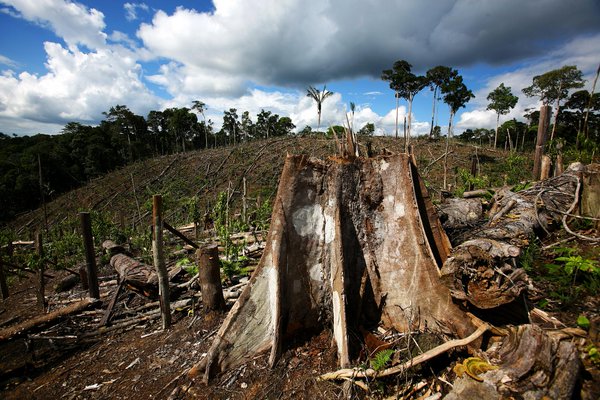
Why environmentalists fear fumes but want the oil
Kampala, Uganda | RONALD MUSOKE | Uganda’s contribution of carbon dioxide into the atmosphere—one of the gases that are infamous for the global climate change crisis—is at the moment insignificant.
Uganda accounts for only 0.01% of the total global carbon emissions while its per capita CO2 emissions are also low at 0.13 tonnes. This is largely because of Uganda’s energy consumption, especially fossil fuel consumption,which is very low. But, that is expected to change when the licenced international oil companies start pumping out the much awaited oil at the beginning of 2025.
The government is pressing on with the oil project at a time when climate change is threatening livelihoods of billions of people around the world. In Uganda, the climate crisis is costing lives and livelihoods in Uganda with flash floods and landslides taking lives and destroying public infrastructure such as roads and farmland. That is why climate change activists remain apprehensive towards Uganda’s crude oil project.
Under the current plan, extraction of the 1.4 billion barrels of recoverable crude oil will take place over the next 25 years. The East African Crude Oil Pipeline (EACOP)—hyped as the longest heated crude oil pipeline in the world— will over this period carry close to 230,000 barrels of heavy crude oil per day from Uganda’s oil fields to the Indian Ocean port of Tanga, in Tanzania, across environmentally sensitive areas.
Thanks to its low sulphur content, the crude oil will require heating above 50oC to flow. Heating stations and a high voltage line to supply power are being planned alongside the 1,445km pipeline, which is to be buried for safety reasons.
Climate change experts say the oil transported by the pipeline will emit at least 33 million tonnes of CO2 every year. However, according to the Environmental Law Alliance Worldwide, a US-based non-profit, burning 210,000 barrels of oil a day that will be transported by the pipeline will produce 34 metric tonnes of carbon annually. The environmental non-profit says this is significantly greater than the current combined emissions of both Uganda and Tanzania.
Interestingly, officials at the Petroleum Authority of Uganda and TotalEnergies say “Uganda’s oil and gas sector is being taken forward in a manner that reduces the negative impact on the environment.”
Ernest Rubondo, the executive director of the Petroleum Authority of Uganda, the state agency responsible for regulating the sector told journalists while giving an update on Uganda’s oil and gas industry on Jan.11 that Uganda’s oil is being developed with the global climate change crisis in mind.
Rubondo said, as a policy, the government for instance has chosen not to flare or burn the gas from the oil fields during the exploration stage. He said the gas estimated at about 500 billion cubic feet will not only be used for electricity generation but will also be used for the production of cleaner liquefied petroleum gas (LPG). Rubondo said there are also plans to use solar energy in the oil and gas activities like heating for aspects of the East African Crude Oil Pipeline (EACOP).
In March, last year, Armand Breuillac, a senior official at TotalEnergies E&P Uganda said Tilenga’s carbon footprint would be less than the average of its global upstream projects.
Speaking in a CERAWeek IHS Markit panel, a global premier energy conference, Breuillac said Tilenga’s emissions will be about 13 kilogrammes of carbon dioxide per barrel of oil produced, which is below Total’s average project carbon intensity of about 20kg per barrel. Yet, not everyone is convinced about the government and oil companies’ carbon emission strategy.
James Muhindo, the national coordinator of the Civil Society Coalition on Oil and Gas (CSCO), a consortium of local and international NGOs that advocates for transparency and accountability in Uganda’s extractives sector told The Independent on Jan.20 that much as civil society appreciates the effort that has been taken to reduce the negative impacts of oil developments on the environment, focusing on environmental offsets is only able to solve half the problem. He said it is quite clear that once oil production starts, there is going to be an increase in Uganda’s CO2 emissions.
“All these activities that are being proposed by the government and oil companies fall under climate offset activities but these are like the final bits on the mitigation hierarchy. The first item is supposed to be avoidance where you choose not to tamper with the natural environment.”
“Uganda chose to go on with the oil project and that is why we are working with the government and the oil companies to ensure that we opt for the second option— minimising the impact on the environment.”
Promises based on nothing
But Dickens Kamugisha, the executive director of the African Institute for Energy Governance (AFIEGO), a Kampala-based non-profit that advocates for responsible investment in Uganda’s oil and gas sector told The Independent on Jan.19 that “all government’s promises are nothing but oil politics because the evidence on the ground does not show that the Petroleum Authority of Uganda is telling the truth about the capacity of the government to extract oil in an environmentally friendly manner.

Kamugisha said it remains to be seen whether Uganda will succeed where other African oil producers such as Nigeria, Angola, South Sudan and Sudan have failed.
“You know that since the discovery of oil, the whole of the Albertine region has been opened up with roads while all critical and iconic environmental futures eg Murchison Falls, Bugoma forest and others are being heavily degraded by land grabbers and other evil people.”
“These are mere rhetorical promises based on nothing other than politics of oil. In the first place, what Petroleum Authority of Uganda is talking about is not contained in the Environmental and Social Impact Assessment (ESIA) for all the oil project eg Tilenga, Kingfisher, EACOP and refinery.”
“The government can say anything and indeed it would be a surprise if they admitted that Uganda’s oil exploitation efforts are taking place at the worst time when the world at large is struggling with the worsening impacts of climate change.”
“How can the government convince Ugandans that they are minding about climate change when they are pushing ahead with the EACOP, Tilenga and King Fisher whose combined total C02 emissions are estimated at over 100 million metric tonnes per year?”
Kamugisha told The Independent that if one considers the environmental and social impact assessment reports for the above oil projects, none contains complete mitigation measures. He says the budgets for managing the risks; including oil impacts on forests, lakes, rivers, wetlands, and national parks, are non-existent.
He adds that the environmental and social impact assessment reports also lack specific indicators monitoring the implementation of the ESIA reports recommendations and conditions.
Kamugisha said Ugandan’s oil sector is at the mercy of God because without clear mitigation plans, oil will destroy the critical biodiversity of the Albertine region.
“As we speak now, the wellpads in Kingfisher are flooded and CNOOC is struggling with the increasing water levels of Lake Albert,” he said told The Independent, adding that this may lead to oil spill.
Climate change crisis
While Uganda is currently not a major emitter of greenhouse gases, emissions will rise significantly in the future given the country’s rapidly growing population and urbanisation that are increasing demand for energy and exacerbated by ongoing oil and gas development.
Reliance on wood fuel still accounts for 88% of the country’s energy mix and only 28% of the country’s population have access to electricity and the two energy sources are climate sensitive.

This reliance on biomass energy is a driver of deforestation and forest degradation that also reduces the country’s resilience to climate hazards such as flooding, drought and landslides.
Besides deforestation is driver to greenhouse gas emissions and adversely affects the delivery of ecosystem services. Uganda is also warming very first and rainfall patterns are becoming more variable.
Uganda’s long term development agenda aims at socio-economic transformation and attainment of an upper income middle income country status by 2040 and to achieve this, the country needs increased access to clean, affordable, and reliable energy.
Dr. Victoria Nalule, a Kampala-based natural resources consultant told The Independent recently that whereas it is urgent to tackle climate change, people should be aware of the energy access challenges in countries like Uganda.
“It would be advisable for the energy transition movement to first focus on tackling energy poverty and access challenges,” she told The Independent.
“Whereas there are various efforts to embrace renewable energy and energy efficiency technologies in African countries, one can’t help but ask if it would be practical to advocate more for clean technologies such as carbon capture?”
“This is precisely because most African developing countries are undergoing urbanisation and industrialisation, additionally, the population growth is expected to increase, as such these countries will require all the energy resources to not only tackle the existing energy access challenges, but also to cope with the anticipated boom in industrialisation, urbanisation and population growth.”
“If the world is to embrace the energy justice and just transition principles, then it becomes essential that poor countries are not made poorer because of the global move to transition to a low carbon economy.”
Even Muhindo of CSCO agrees. He told The Independent that countries in the “Global South” where Uganda belongs are still grappling with development challenges.
“People in countries like Uganda want their access to energy and all amenities that make life worth living guaranteed by their government,” he said, “They don’t expect their government to have excuses of achieving those aspirations.”
Muhindo said the reason oil is being exploited is to generate revenue, create jobs and, in the short term, to have life improve for Ugandans. It’s a Catch-22.
“It’s important for us to protect the environment, it’s important for us to think about future generations and the planet but in the immediate term it’s equally important for the government to meet its obligations to its citizens,” Muhindo says.
“If the rest of the world has met those obligations through fossil fuels, then the governments in the Global South have to do everything at its disposal to meet those obligations using fossil fuels.”
Muhindo told The Independent that government officials should quit politicking and start a candid and honest conversation. “Much as the water is cold, we are already naked and we have to bathe in it but that does not mean the water is any less cold,” he said.
****
 The Independent Uganda: You get the Truth we Pay the Price
The Independent Uganda: You get the Truth we Pay the Price


